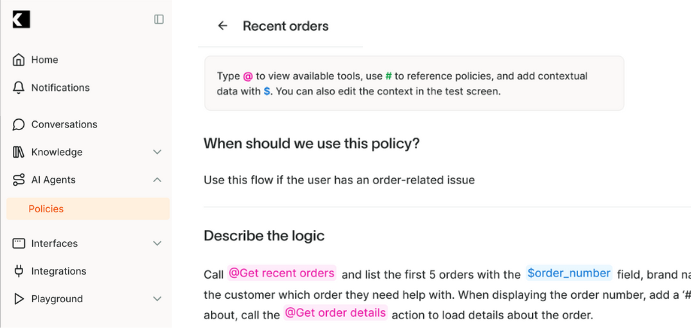Ingredients
Shopify, Gladly, and Kodif.
What are AI Policies?

At Kodif, we’re excited to announce the launch of Policies—a powerful, dynamic solution designed to revolutionize the way CX managers handle customer support. Unlike traditional flows, which are rigid and complex, Policies empower non-technical users to create and manage customer interactions with ease. Written in natural language, Policies make it simple to define and refine customer experiences without needing to rely on complicated flowcharts or scripting. This approach is not only user-friendly but also self-serve, enabling CX teams to quickly translate existing Standard Operating Procedures (SOPs) into automation, saving valuable time and resources.
The flexibility of Kodif Policies ensures that businesses can offer personalized, context-driven support while continuously improving customer experiences. With Policies, you can experiment with different strategies to optimize outcomes such as CSAT, revenue, and retention—all without the need to rebuild complex workflows. Whether it’s automating routine interactions or testing new approaches for high-stakes scenarios, Policies provide a scalable, adaptable solution that aligns with your business goals. While flows still have their place in sensitive, high-risk situations, Policies offer an agile alternative that helps businesses innovate faster and deliver exceptional, tailored experiences at scale.
“Get order info” ticket type explained
In customer support, the “Get order info” ticket type refers to requests where customers seek information about their orders. This typically includes inquiries about order status, delivery times, tracking details, or any changes to their orders. Efficient handling of these tickets is crucial as it directly impacts customer satisfaction and trust. By automating these requests with AI-powered solutions like Kodif Policies, businesses can provide swift and accurate responses, reducing wait times and enhancing the overall customer experience.
Which Platforms does this AI policy work on?
This AI policy is specifically designed to work on Shopify, Gladly, and Kodif. Additionally, Kodif integrates seamlessly with all other major platforms, ensuring broad applicability and easy integration into existing systems.
When should I use this policy?
This policy should be used when customers inquire about the status of their orders, a common request known as WISMO (Where Is My Order?). By automating the response process, businesses can efficiently provide detailed order statuses, improve customer satisfaction, and reduce the burden on support teams.
Policy logic
The logic for automating “Get order info” requests is straightforward and can be implemented using Kodif’s AI policy tools. Here’s a step-by-step process:
-
Ask for the user’s email address
a. Utilize@get_shopify_account_detailsto verify if the email exists in Shopify.
b. If not found, request a valid email address.
c. Route to an agent if the email remains unverified. -
Display Recent Orders
a. Use@get_shopify_ordersto fetch recent orders.
b. Present the order list and ask the user to specify which order they need information about.
c. Route to an agent if the order is not found. -
Check Order Status
a. Retrieve shipping status using@shopify_order_details(order_id: str).
b. Provide appropriate information based on status:- Approved: Waiting to be processed.
- Processing: Awaiting shipment.
- Pending Shipment: Provide shipment date.
- Shipped: Provide tracking number.
- In transit: Verify estimated delivery date and inform accordingly.
- Delivered: Confirm with the customer.
- Canceled: Inform the order was canceled.
Example policy
Here’s an example of how the policy works:
-
Ask for the user’s email address
a. Use@get_shopify_account_detailsfor email verification.
b. Request a valid email if not found.
c. Route to an agent if unresolved. -
Display Recent Orders
a. Retrieve orders using@get_shopify_orders.
b. Inquire about the specific order of interest.
c. Route to an agent if no order is found. -
Check Order Status
a. Use@shopify_order_details(order_id: str)to check status.
b. Provide detailed status updates, including expected delivery and tracking information.
c. Route to an agent for any discrepancies or issues.


